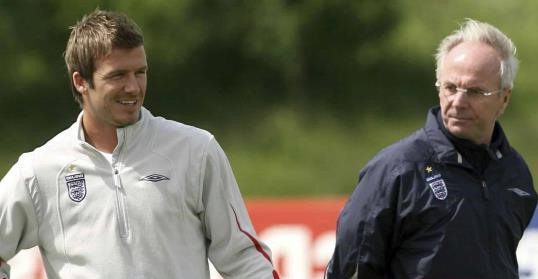BTN News: Sven-Goran Eriksson, the renowned Swedish football manager who became the first foreign coach of the England national team, has passed away at the age of 76. Known for his strategic brilliance and calm demeanor, Eriksson enjoyed a storied career that spanned several decades and countries, leaving an indelible mark on the world of football. He died peacefully on Monday at his home, surrounded by loved ones, after a battle with pancreatic cancer, as confirmed by his agent, Bo Gustavsson, to The Associated Press.
Eriksson’s death comes just eight months after he publicly revealed his cancer diagnosis, acknowledging that he had been given a prognosis of no more than a year to live. During this final period, he received a flood of tributes from players and clubs he had previously coached, reflecting the widespread respect and admiration he garnered throughout his career. A documentary chronicling his life and achievements was produced, and he was honored by his favorite club, Liverpool, with the opportunity to serve as a guest manager during a charity match.
Early Life and Modest Playing Career
Born in Torsby, Sweden, Eriksson, affectionately known as “Svennis” in his home country, began his football journey as a player. However, his playing career was relatively modest, spanning just nine years, and he hung up his boots at the young age of 27. It was on the sidelines where Eriksson truly found his calling, embarking on a managerial career that would take him across Europe and eventually to the pinnacle of international football.
Rise to Fame in Club Management
Eriksson’s rise to fame in the football world began with his success in club management. He achieved significant success in Sweden, Portugal, and Italy, most notably with IFK Gothenburg, Benfica, and Lazio. His time at Lazio was particularly memorable, where he led the club to a Serie A title, as well as victories in the Coppa Italia, Supercoppa Italiana, and UEFA Cup Winners’ Cup. His tactical acumen and ability to get the best out of his players made him one of the most sought-after managers in Europe.
The England Years: A Controversial but Successful Tenure
In 2001, Eriksson made history by becoming the first foreign manager of the England national team. His appointment was met with skepticism, but he quickly silenced his critics by leading England to a stunning 5-1 victory over Germany in Munich during the 2002 World Cup qualifiers. This victory secured England’s place in the tournament and elevated Eriksson’s status in the country.
Under Eriksson’s guidance, England’s so-called “Golden Generation,” which included stars like David Beckham, Steven Gerrard, and Wayne Rooney, reached the quarterfinals of the 2002 and 2006 World Cups. Despite the talent at his disposal, England’s campaigns ended in disappointment, with the team being eliminated by Brazil in 2002 and Portugal in 2006. The Euro 2004 tournament followed a similar pattern, with England once again being knocked out by Portugal in the quarterfinals, this time in a heartbreaking penalty shootout.
During his tenure, Eriksson also became a fixture in the British tabloids, not just for his footballing decisions but for his private life. His relationships with Swedish TV personality Ulrika Jonsson and Faria Alam, a secretary at the English Football Association, were widely reported, contributing to the media frenzy surrounding his time in England. Reflecting on this period, Eriksson later remarked, “My private life was not very private in England.”
Post-England Career: International and Club Management
After leaving the England job in 2006, Eriksson continued to manage at both club and international levels. His subsequent roles included stints with the national teams of Mexico, Ivory Coast, and the Philippines. His time with Mexico was brief, and he was dismissed in 2009 following a poor run of results during the 2010 World Cup qualifiers. Despite these challenges, Eriksson’s legacy as a manager was already firmly established.
His international management was complemented by various club roles, although he never quite recaptured the heights of his earlier successes. Nevertheless, his influence on the game remained significant, and he was often called upon for his expertise and experience.
Tributes and Final Days
As news of Eriksson’s condition became public, the football community rallied to show their support. One of the most touching tributes came from David Beckham, who credited Eriksson for making him England captain and shared a heartfelt message on Instagram following a recent reunion. “We laughed, we cried, and we knew it was a farewell,” Beckham wrote. “Sven, thank you for always being that person — passionate, caring, calm, and a true gentleman. I will always be grateful for you naming me your captain, but I will cherish the final memories with you and your family… Thank you, Sven, and in your last words to me: ‘I will be fine.'”
Eriksson’s final months were marked by reflection and gratitude, both from him and those he influenced throughout his career. The tributes, documentary, and the special day with Liverpool highlighted the deep affection and respect the football world held for him.
A Legacy That Transcends Borders
Sven-Goran Eriksson’s death marks the end of an era for a manager who transcended borders and brought a sense of calm and class to the often tumultuous world of football. His achievements with clubs like Lazio, Benfica, and IFK Gothenburg, combined with his historic tenure as England manager, ensure that his legacy will endure. Eriksson’s story is one of perseverance, success, and a relentless pursuit of excellence, leaving a lasting impact on the sport he loved.
His passing is a reminder of the transient nature of life but also of the enduring legacy that a dedicated and passionate individual can leave behind. As the football world mourns the loss of Sven-Goran Eriksson, it also celebrates the life of a man who made an indelible mark on the beautiful game.


